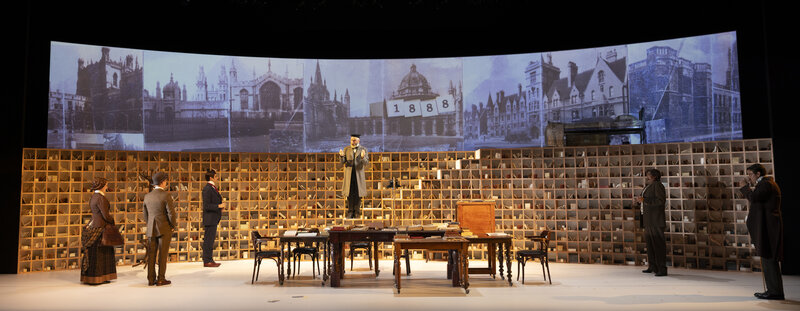[THEATRE REVIEW] THE DICTIONARY OF LOST WORDS @ Arts Centre Melbourne Review (2024)
What is in a word? Everything … for the person around whom the sweeping tale The Dictionary of Lost Words focuses.
I speak of Esme Nicoll (Brenna Harding), to whom we are introduced in the year 1886.
At the time, she is four years of age and being brought up by her intelligent, decent and caring father, Harry (Brett Archer). Her mother died during childbirth.
Harry works for Sir James Murray (Chris Pitman), who has taken on the monumental task of compiling a dictionary from scratch.
The pair is joined by a handful of others that work in a place known as The Scriptorium, effectively a garden shed.
They rely heavily upon notes, posted in by those interested in seeing particular words in print.
These “submissions” offer the meaning of the words.
Then it is up to Sir James’ team to verify their origins and determine whether they are appropriate to be included in a dictionary.
It is painstaking work, but the collective passion for it is unquestionable. For all intents and purposes, it is like religious zealotry.
At the start of the play, Harry – who takes Esme to work with him – is teaching his daughter to read and appreciate language.
She takes to it like a duck to water, although an unfortunate accident involving her mother’s name, Lily, leaves her disfigured.
Before long, Esme is secreting slips of paper containing new words that fall to the floor of The Scriptorium and, over time, she develops quite a stash.
Just what will become of them forms part of the narrative.
Suffice to say, the kindhearted and good-natured Esme thinks there is no more worthy pursuit than that of a lexicographer (a person that compiles dictionaries).
Nevertheless, there is a naivete about her.
Over of the next three decades, she will experience a great deal, including enlightenment and heartache.
Always in her court is the family’s dutiful maid, Lizzie Lester (Rachel Burke), who has her own challenging back story.
Part of her emancipation involves trips to The Covered Market in Oxford.
It is where she is introduced to colourful characters, including former prostitute Mabel (Ksenja Logos) and actress turned staunch feminist Tilda Taylor (Angela Mahlatjie).
The Dictionary of Lost Words spans the emergence of the women’s suffragette movement and the outbreak of WWI.
There is something special about the journey we undertake.
Set in a bygone era, the prose penned by playwright Verity Laughton bring with them human connection and interaction that feel real.
She has adapted Pip William’s 2020, award-winning New York Times bestseller and book club favourite into compelling theatre.
The play centres on the fictional character of a woman that helped compile the first Oxford English Dictionary … and more.
It is a slow-burn piece, in which patience is rewarded. It is infused with the harsh realities of the world, together with heart and humour.
The eight-strong cast is led with style and grace by a composed Brenna Harding.
Brett Archer brings dignity to Harry Nicoll, while Chris Pitman is nothing if not perseverant and buoyant as Sir James Murray.
Several of the actors assume multiple roles.
Rachel Burke is dutiful and protective as Lizzie Lester.
Ksenja Logos excels as the pragmatic, cheeky and cheery Mabel.
Angela Mahlatjie conveys commitment to a cause as Tilda Taylor.
Jonathon Oxlade’s impressive, sprawling set is indicative of an historic work environment with pigeonholes aplenty.
He has added stairs, leading up to a single bed in a pristine environment, contrasting the busy with the minimalistic.
Video footage helps elevate the spectacle, defines locales and indicates time frames.
The latter is also established through Ailsa Paterson’s evocative period costuming.
Directed by Jessica Arthur, prepare to be transported to a wordsmith’s paradise, a world in which women find their voice on their terms and in their way. Three hours, including a 20-minute interval, The Dictionary of Lost Words is on at Playhouse, Arts Centre Melbourne, until 17th March, 2024.
Review by Alex First. Photography by Pia Johnson
